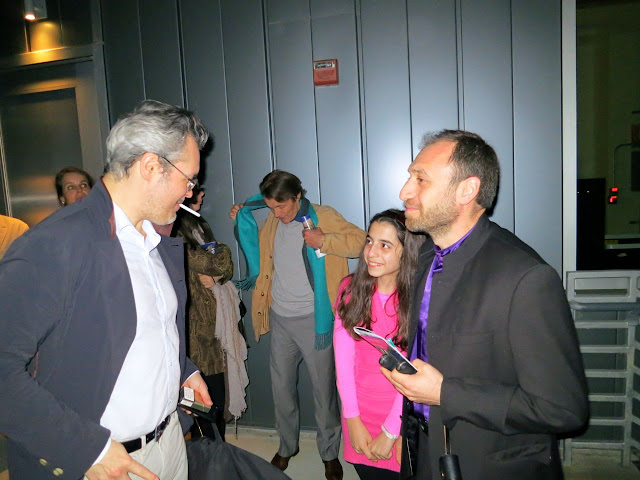I recently acquired two very interesting but two very different collections of Beethoven piano works. The first was a long-sought-after complete set of Beethoven Sonatas by Annie Fischer on Hungaraton. The other was a collection of Claudio Arrau's EMI Beethoven recordings from the mid-1950's. Having acquired them virtually simultaneously, comparisons were inevitable.
The Fischer set has acquired quite a reputation. Some have called it the most satisfying complete set of Beethoven Sonatas ever recorded, which is heady praise. The complete set was available briefly as an import in the US, and some but not all of the individual volumes found their way across the water too. These recordings have been out of print for some time and the lowest offering price on Amazon Marketplace for the complete set is currently $450. All of these factors have given this set quite a cache and raise expectations to an unhealthy level.
After searching for over a decade, I finally landed a reasonably-priced copy. My initial reaction was disappointment. While there was nothing overtly “wrong”, I wouldn't rank this set higher than the middle of a very crowded pack. The first word I would use to describe it is “stiff.” The playing sounds a bit stiff, Fischer's mechanism, while capable of navigating the notes without mishap, sounds slightly uneven and stiff too. Even the action of the Bosendorfer she plays sounds stiff. The tonal palate she achieves is quite limited. While there is little banging, there is also little softness and even less beauty. If I were listening blind and were asked to identify the provenance of the recording, I would have guessed “a faculty member recital from a very good conservatory,” which it turns out isn't very far from the truth. Fischer recorded several Beethoven Sonatas for EMI in London in the early 1960's. Although the recorded sound is better on Hungaroton, I think the EMI recordings are better overall.
The Arrau was both an excellent contrast and an excellent example of my point. Any 15 second segment announces that you are listening to a master pianist. This set captures Arrau in a very interesting period of his career. His playing is much more spontaneous and vibrant than it became even ten years later when he re-recorded all of the sonatas for Philips. His unique tonal palette and musical mastery are all there, even though many of the recordings themselves sound boxy. EMI seems to have pawned him off to their “B” team, and some (but not all) of these recordings even as late as 1958 are in mono. It's doubly sad considering what superior sound RCA, Mercury, Decca, and even Columbia were achieving contemporaneously and just how important Arrau's tone was to his artistry.
Arrau can be an acquired taste. Many find him to be too slow and deliberate, but there is also such depth of sound and such an incredible sense of musical tension (Arrau famously believed that “speed was the enemy of passion”). Once experienced, this tension seems so appropriate to Beethoven that one can't imagine anyone attempting this music without it. This is one of the hallmarks of a great interpretation: its way seems to be “the” way. This isn't really true, but in the moment the performance holds you in its spell. This element of “rightness” (even if it's “false rightness”) I find absent in Fischer's recordings.
The Arrau box also contains a complete Beethoven Concerto cycle with Galliera conducting. All but the Fourth are in stereo, though again not in wonderful sound. Still, I think I'd choose this set as the best of Arrau's Beethoven Concerto cycles. I had given up on Arrau in the First and Second Concertos. His recordings for Philips (both in the mid-1960's and the mid-1980's) sound leaden. It's not just the very slow tempi (though here they clearly don't help). It feels that Arrau has trouble connecting with the spirit of very early Beethoven. One wonders if he would have even bothered with these pieces if it weren't to complete a recording cycle. The EMI recordings of these pieces are a major surprise. They're good! Now I wonder what made Arrau lose the thread of these works only a few years later.
The “Emperor” is a surprise as well. It's absolutely fantastic. I think it's the best of the four Arrau “Emperors” I now own (the others are Klemperer (live), Haitink (1970), and Davis (1984)). Speaking of Klemperer, when I learned Arrau recorded the Beethoven Concerto cycle on EMI, I was initially disappointed to learn that EMI (i.e. Walter Legge) had chosen Galliera to conduct these recordings instead. Now that I've heard them, I'm not disappointed at all. Galliera is another one of those “sneaky great” conductors who didn't have a blazing reputation but never put out a bad recording. And thanks to Testament, we now have contemporaneous Arrau/Klemperer recordings of Concertos 3 through 5 as well. Lucky early 21st century collectors, though I wish EMI hadn't waited nearly 50 years to approve their release.
Of course, these are just my reactions. If you're reading this and feel differently, I'd love to hear what you think and why. You may not change my mind, but you never know. There was a time when I couldn't get past Arrau's slowness, which was even more pronounced in the later recordings which were my first exposure to him. Let's discuss.





